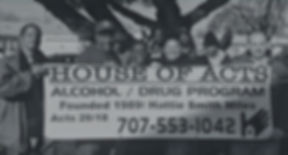
Hope, Healing, and
Lasting Recovery
A Legacy of Compassion and Support
About Us
Since 1987, House of Acts has been dedicated to empowering individuals in recovery, building resilience, and creating opportunities for long-term success. House of Acts is a 501(c)3 tax-exempt organization, licensed and certified by the California Department of Health Care Services (DHCS). Based in Vallejo, California, we're on a mission to provide compassionate, evidence-based care and support services for individuals overcoming substance use disorders and co-occurring mental health challenges. Through decades of service, we’ve helped countless individuals reclaim their lives and become thriving members of their communities. By providing access to sober living, clinical counseling, workforce opportunities, and educational programs, House of Acts continues to drive meaningful change.
Inclusion, Diversity, and Equity Advancement (IDEA)
House of Acts proudly upholds a commitment to inclusivity and equity, serving all individuals regardless of age, race, color, religion, national origin, physical disability, gender, sexual orientation, gender identity, marital status, military status, or group affiliation. We are guided by the principles of Inclusion, Diversity, Equity, and Action (IDEA). We are dedicated to stimulating a welcoming environment where every individual is valued, respected, and supported on their journey to recovery and career journey. • Inclusion: We strive to create safe places where all individuals feel seen, heard, and empowered to contribute. • Diversity: We celebrate the unique lived experiences, backgrounds, and perspectives that enrich our community. • Equity: We are committed to removing barriers and providing fair access to resources and opportunities for everyone. • Action: We go beyond words by implementing meaningful initiatives that promote justice, transformation, and empowerment. Through IDEA, we aim to build a compassionate community where healing and growth are accessible to all, and where recovery paves the way for lasting change.
Why Choose
House of Acts?
-
Comprehensive Care: From clinical counseling to workforce development, we address all aspects of recovery.
-
Community-Centered: We work closely with local organizations to create opportunities for those in recovery.
-
Proven Results: Decades of success stories demonstrate our commitment to transforming lives.
Hattie Miles (d. 2020)
BS/CADC
Founder & Emeritus Director
Learn more about Mrs. Hattie
Taira Scott, President
The T. Scott Law Group
Founder & Attorney
R. Shay Miles, Treasurer
Miles McNeal & Powell LLC
Founder & Chairwoman
Dr. Hassaan Tohid
California Institute of Behavioral Neurosciences and Psychology (CIBNP)
Co-Founder & CEO
Constance Jones
Registered Nurse (RN)
Retired
Valerie Madison, Secretary
Vallejo Police Officer
Retired
Bishop Bryan Harris
Emmanuel Temple Church
Senior Pastor & Community Activist
Diane Davis
In-Home Care Provider
Retired
Sheila Nixon
Executive Director
Claude Young
CADC
Workforce Supervisor
Sandi Rose Ellerbe
SUDCC II, HCV/HIV/STI
Clinical Counseling Supervisor
Josephine Santel
Thrift Store Supervisor
"Your life does not get better by chance, it gets better by change.”
— Jim Rohn
Entrepreneur; Personal Development Expert